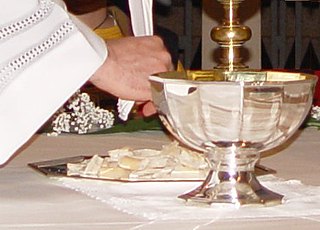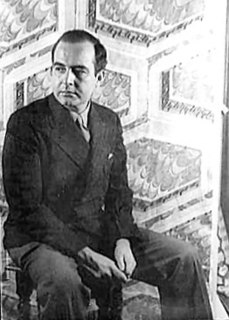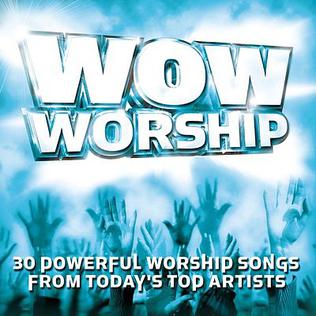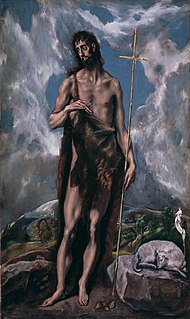
Agnus Dei is the Latin name under which the "Lamb of God" is honoured within the Catholic Mass and other Christian liturgies descending from the Latin liturgical tradition. It is the name given to a specific prayer that occurs in these liturgies, and is the name given to the music pieces that accompany the text of this prayer.

Lamb of God is a title for Jesus that appears in the Gospel of John. It appears at John 1:29, where John the Baptist sees Jesus and exclaims, "Behold the Lamb of God who takes away the sin of the world." It appears again in John 1:36.
Godfather most often refers to a male godparent in the Christian tradition.
Lamb or The Lamb may refer to:
The ordinary, in Roman Catholic and other Western Christian liturgies, refers to the part of the Mass or of the canonical hours that is reasonably constant without regard to the date on which the service is performed. It is contrasted to the proper, which is that part of these liturgies that varies according to the date, either representing an observance within the liturgical year, or of a particular saint or significant event, or to the common which contains those parts that are common to an entire category of saints such as apostles or martyrs.
Agnus Dei generally refers to a liturgical prayer in honor of the Lamb of God, as used in Christian theology. It also refers to liturgical music which accompanies this prayer as part of a Mass setting.

Agnus Dei is a choral composition in one movement by Samuel Barber, his own arrangement of his Adagio for Strings (1936). In 1967, he set the Latin words of the liturgical Agnus Dei, a part of the Mass, for mixed chorus with optional organ or piano accompaniment. The music, in B-flat minor, has a duration of about eight minutes.
Deus is the Latin word for "god" or "deity". Latin deus and dīvus ("divine") are in turn descended from Proto-Indo-European *deiwos, "celestial" or "shining", from the same root as *Dyēus, the reconstructed chief god of the Proto-Indo-European pantheon.

WOW Worship: Aqua is the sixth installment in the WOW Worship series. The collection features 33 "powerful worship songs from today's top artists", eight of which were newly recorded for this album. WOW Worship: Aqua was marketed to both the praise and worship lover and to fans of popular artists in Christian music. The album reached #75 on the Billboard 200 chart. The album was certified as gold in 2006 by the Recording Industry Association of America (RIAA).

Mass of the Children is a major work of English composer John Rutter. It is a non-liturgical Missa brevis, with the traditional Latin and Greek Mass text interwoven with several English poems.
WOW Gospel Christmas includes thirty songs on a double CD album. In 2007 it reached #78 on the Billboard 200 chart, took first place on the Top Gospel Albums chart, and 20th spot on the Top R&B/Hip-Hop Albums chart. In 2008 it reached 24th spot on the Top R&B/Hip-Hop Albums chart.
Agnus can be used to refer to :
The Lamb of God is the first part of a three book, comprehensive presentation of Eastern Orthodox theology by Sergei Bulgakov, first published in Russian in 1933 as Agnets Bozhyi by YMCA Press. The book is in effect a comprehensive presentation of the Eastern Orthodox Christological perspective, which is then followed by his other works on pneumatology.

Lamb of God is an oil painting completed between 1635 and 1640 by the Spanish Baroque artist Francisco de Zurbarán. It is housed in the Prado Museum in Madrid, Spain.

"O Lamm Gottes, unschuldig" is an early Lutheran hymn, with text and melody attributed to Nikolaus Decius. Originally intended as a German version of the Latin Agnus Dei, it was instead used as a Passion hymn. In both contexts, the hymn has often been set to music, prominently as the cantus firmus in the opening chorus of Bach's St. Matthew Passion. It is included in most German hymnals, and has been translated by Catherine Winkworth, among others.

The Innocents, also known as Agnus Dei, is a 2016 French film directed by Anne Fontaine, which features Lou de Laâge, Agata Kulesza, Agata Buzek and Vincent Macaigne in its cast. The script is by Sabrina B. Karine, Pascal Bonitzer, Anne Fontaine and Alice Vial, after an original idea by Philippe Maynial. Maynial took inspiration from the experiences of his aunt, Madeleine Pauliac, a French Red Cross doctor who worked in Poland after World War II, dealing with the aftermath of mass rapes by Soviet soldiers.

"Christe, du Lamm Gottes" is a Lutheran hymn, often referred to as the German Agnus Dei. Martin Luther wrote the words of the hymn as a translation of the Latin Agnus Dei from the liturgy of the mass. The tune, Zahn 58, was taken from an older liturgy. The hymn was first published in 1528 and has been the basis for several musical settings by composers such as Bach, Mendelssohn and Hessenberg. It appears in modern German hymnals, both the Protestant Evangelisches Gesangbuch and the Catholic Gotteslob.

Saint John the Baptist is an oil on canvas painting executed between 1597 and 1607 by the Greek artist El Greco whilst living in Spain. It is in the collection of the Legion of Honor museum, a component part of the Fine Arts Museums of San Francisco.

"Lamm Gottes, für uns gegeben" is a Christian hymn in German with text by Eugen Eckert and a tune by Horst Christill. It is of the genre Neues Geistliches Lied. The song reflects the liturgical Agnus Dei. It is part of regional sections of the common German Catholic hymnal.

"Jesus Christus, Sohn des Lebens" is a Christian hymn of the genre Neues Geistliches Lied by Eugen Eckert, with a melody by Peter Reulein. The song is an extended paraphrase of the Agnus Dei. It is part of hymnals and songbooks.









